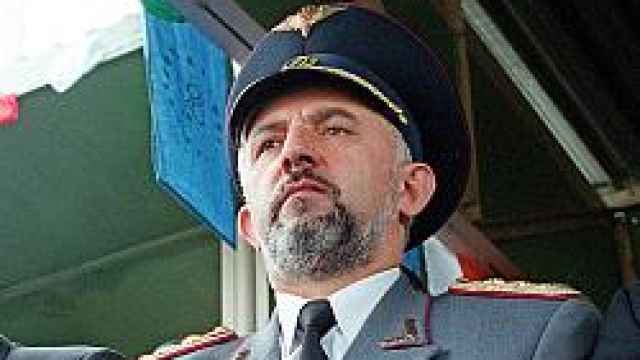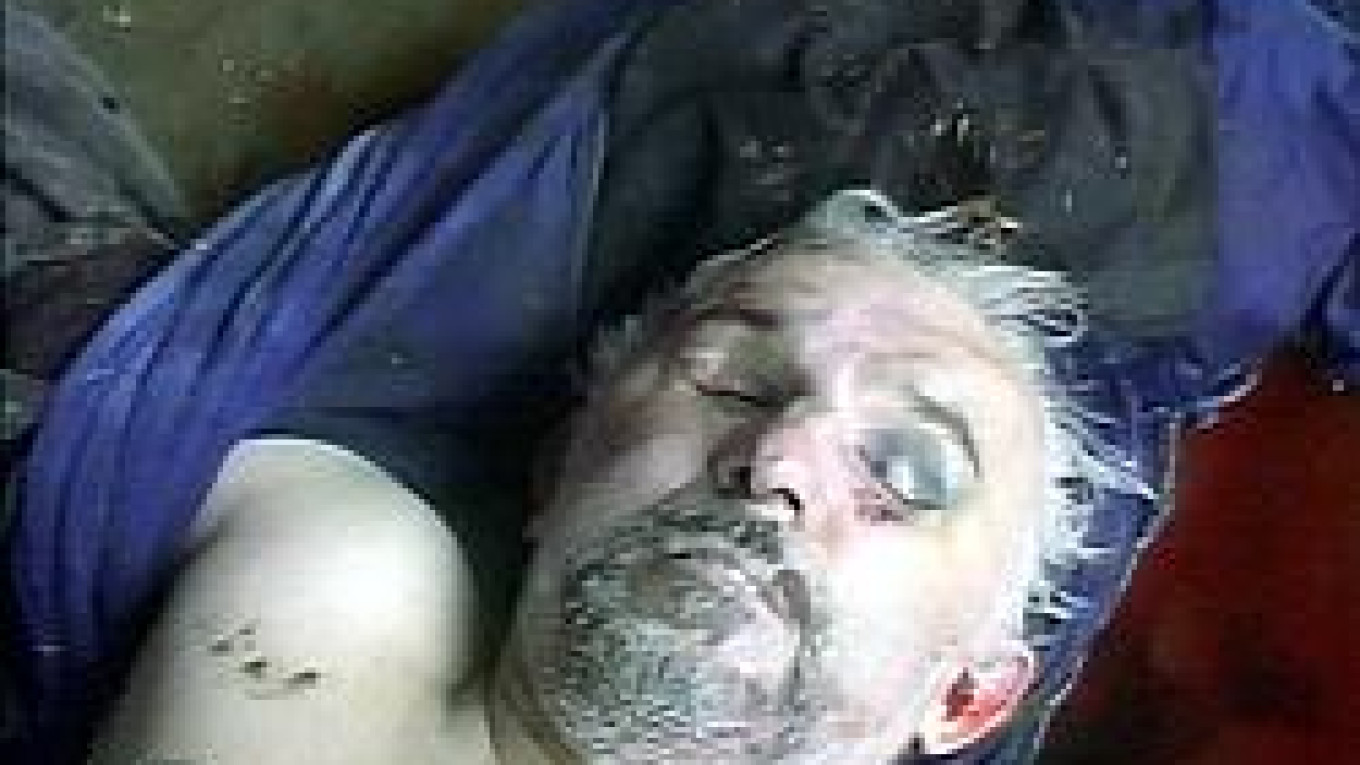Moscow-backed Deputy Chechen Prime Minister Ramzan Kadyrov called Maskhadov's death a gift for all Chechen women on the Women's Day holiday Tuesday, while Maskhadov envoy Akhmed Zakayev and fierce Kremlin critic Boris Berezovsky warned that Moscow might have lost its only chance to bring peace to Chechnya.
The federal military headquarters for the North Caucasus confirmed that Maskhadov was dead, but the circumstances surrounding his death were unclear.
Patrushev offered few details of the FSB operation in the televised portion of his meeting with Putin, saying only that Maskhadov had died after a standoff in Tolstoy-Yurt, which is located just 15 minutes by car from Grozny and is in an area usually under tight control by federal forces.
Putin praised the work of the FSB, which placed a $10 million bounty on Maskhadov after the Beslan school attack in September. "We must augment the effort aimed at the defense of the citizens of the republic," Putin said.
He told Patrushev to conduct an extra check to make sure that the body had been identified correctly.
As of Tuesday night, there was no independent confirmation that Maskhadov was dead.
NTV television showed footage of the half-naked body of a gray-bearded man who resembled Maskhadov lying sprawled in a pool of blood. Both of his eyes looked bruised and beaten in. The footage showed the body surrounded by a pile of weapons, including guns and hand grenades. A masked soldier was shown unfolding a green, red and white Chechen flag.
Ilya Shabalkin, spokesman for federal forces in the North Caucasus, said the body was found in a bunker and that three of Maskhadov's aides, including a nephew, were detained, Interfax reported. Earlier Tuesday, authorities said three rebels who were planning a large terrorist attack in Tolstoy-Yurt had been detained. (Story, page 4)
Shabalkin told Channel One television that the raid started at 8 a.m. Tuesday during a sweep for rebels. He said special forces received information from various sources, including local residents, that Maskhadov was in the village. He said Maskhadov was hiding in a bunker and that he was killed after they blew it up in an attempt to get him out.
Kadyrov, however, said the plan had been to take Maskhadov alive but he was killed when a bodyguard next to him "carelessly handled his gun," Interfax reported. "The task before them was to detain Maskhadov. Nobody intended to physically kill him," he said.
"We intended to take him alive and after questioning [we intended] to appoint him as commander of a platoon or a company in the security services," he said.
Kadyrov did not say whether he was referring the 5,000-member Chechen security force that he heads and is accused by human rights groups of arbitrarily detaining and torturing Chechens.
Kadyrov's remarks appeared to be an attempt to avoid a possible eruption of violence in retribution for Maskhadov's killing.
Chechnya's interior minister, Ruslan Alkhanov, confirmed that the operation was carried out by the FSB. "This was a unique operation, and we can only regret that Maskhadov was not killed by Interior Ministry staff," he said, referring to the Chechen police force, Interfax reported.
He said Chechens were already welcoming Maskhadov's death.
Zakayev, who has been granted asylum in Britain, warned that Maskhadov's death, if confirmed, would lead to an outburst of terrorism across Russia.
"If this is confirmed, it is yet another political assassination conducted under the orders of Russia's highest leadership," Zakayev said on Ekho Moskvy radio.
"But I am absolutely sure that this could further complicate the situation, since Maskhadov was the factor limiting the conflict from spreading even further."
Zakayev also said Maskhadov's death would confirm the views of those who say it is impossible to negotiate with the Kremlin.
He added that if Maskhadov was dead, his power would be transferred to a person elected by the rebels' so-called defense committee. He said warlord Shamil Basayev, who has claimed responsibility for the Beslan school tragedy and a series of other terrorist attacks, was not a member of the committee and therefore could not become its chairman.
Valentina Melnikova, the head of the Union of Soldiers' Mothers Committees human rights group, which in recent months has been seeking to kick-start peace talks between Moscow and Maskhadov and met last month with Zakayev in London, said by telephone that she was worried about what would happen next in Chechnya.
"It is too early to try to predict how the situation will develop," she said. "It could well be that all of the groups of fighters will scatter and dissolve or that somebody like Shamil [Basayev] will get full control."
Melnikova said she believed that Maskhadov had control of up to 90 percent of the rebels.
Berezovsky said "there could not be anything worse" than Maskhadov's death.
"This will lead to the destruction of Russia," he said by telephone from London, where he has been granted asylum.
"I consider that they have killed the main figure within the Chechen separatists who wanted to make peace, not war," he said. "Maskhadov was the only leader within the separatists who was seeking peace.
"Now there will be more extreme radical forces in Chechnya. Now there will be more terror in Chechnya, in the North Caucasus, and in Russia as a whole."
He added: "This all comes as a result of Putin's position, his refusal to seek peace. The murder of Maskhadov will lead to the multiplying of terrorist groups."
Putin's Kremlin had steadfastly refused to negotiate with Maskhadov, whom it referred to as a terrorist. It blamed Maskhadov for numerous terrorist attacks but also maintained that he had little control over rebel groups.
Born in Kazakhstan, Maskhadov 53, was a career officer in the Soviet Army until the Soviet collapse in 1991. By 1994, he had risen to the rank of chief of staff of the Chechen armed forces under then-Chechen president Dzhokhar Dudayev. When Moscow sent troops and tanks to Chechnya in December 1994, Maskhadov was in charge of the presidential palace defense in Grozny. He became a field commander the next year.
 Natalya Medvedeva / AP Aslan Maskhadov, then the president of Chechnya, watching a Chechen independence parade in Grozny on Sept. 6, 1999. | |
In fall 1999, however, Moscow sent troops back into Chechnya after Chechnya-based militants invaded Dagestan and several apartment building bombings in Moscow and other Russian cities.
Maskhadov went into hiding.
Dmitry Rogozin, head of the nationalist Rodina faction in the State Duma, said Maskhadov's death was only a first step toward bringing peace. "Maskhadov, according to our information, did not have as much influence as Basayev did and was more like a leader of a regiment of toy soldiers," Rogozin said, Interfax reported.
"I would like to believe that terrorist activities will drop after Maskhadov's death. But ... we need to find Basayev," he said.
Duma Deputy Frants Klintsevich, who heads the Chechen branch of United Russia, predicted that Maskhadov's death would lead to "the last death throes of the Chechen terrorists."
"Bandits like Basayev and others used Maskhadov as a cover for their terrorist acts in an attempt to make them look like part of a political battle," he told Interfax. "I predict that Basayev's people might give him up soon."
A senior United Russia deputy, Security Committee deputy head Mikhail Grishankov, said rebels would now lose a lot of their foreign financing.
"Maskhadov was the figure who actively helped the flow of money into Chechnya from abroad, and with his death this financial flow should significantly drop," he said.
But he cautioned that Basayev would "continue to pose a serious threat."
Kadyrov vowed that Basayev would be next. "A similar fate is now awaiting Shamil Basayev. We will put him on exhibit in the center of Grozny for all to see," he said.
The FSB has also placed a $10 million bounty on Basayev's head.
It was unclear who would collect the $10 million reward offered for Maskhadov's capture.
Kadyrov said Maskhadov's body would be given to his relatives, while Shabalkin said the law forbade the handing over of bodies of terrorists.
A Message from The Moscow Times:
Dear readers,
We are facing unprecedented challenges. Russia's Prosecutor General's Office has designated The Moscow Times as an "undesirable" organization, criminalizing our work and putting our staff at risk of prosecution. This follows our earlier unjust labeling as a "foreign agent."
These actions are direct attempts to silence independent journalism in Russia. The authorities claim our work "discredits the decisions of the Russian leadership." We see things differently: we strive to provide accurate, unbiased reporting on Russia.
We, the journalists of The Moscow Times, refuse to be silenced. But to continue our work, we need your help.
Your support, no matter how small, makes a world of difference. If you can, please support us monthly starting from just $2. It's quick to set up, and every contribution makes a significant impact.
By supporting The Moscow Times, you're defending open, independent journalism in the face of repression. Thank you for standing with us.
Remind me later.


